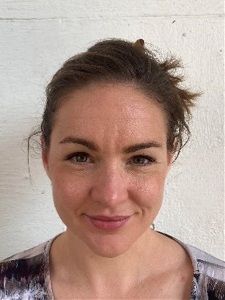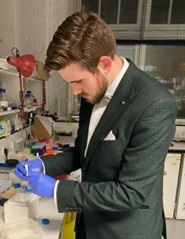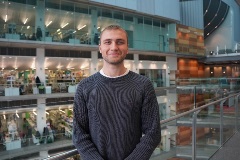
My project is to study diffusion-weighted MRI from the “ground up”, using a controlled system to investigate the relevance of MR techniques for oncological applications. We hope to link the MRI acquisitions to tissue properties which are at dimensions below the resolution limit of the image. Initially, I’ll be building on aspects of my previous MSc project. However, I hope to learn far more about various MR techniques, including those used outside of current clinical application.
Before joining the CSC programme I was working as a Clinical Scientist specialising in MRI Physics at The Royal Marsden NHS Foundation Trust.
With the link between the ICR and Imperial College, I hope to delve deep into a “basic science” question, whilst also keeping a focus on potential clinical translation. The multidisciplinary nature of the project offers the opportunity to explore new avenues, and the interesting challenge of synthesising knowledge across disciplines.
Learning lots of new things, and hopefully looking back at the end of the year to see how far I’ve come.
I’m a beekeeper. We (my husband and I) currently have 3 hives, and harvested around 50 jars of honey this year.

HGSOC has a very high mortality rate due to Platinum chemotherapy resistance. This project has the potential to deepen our understanding of multi-drug resistance which is one of the most pressing issues in modern cancer medicine.
MSci Cell Biology at UCL. Final project was titled “REXO1 as a target for R-Loop based cancer therapy”
This specific project allows for the interdisciplinary collaboration with a Physics lab to utilise cutting edge SRM microscopy which was very appealing to me. The interdisciplinary nature of CSC projects provides more angles of approach to solve a problem than just one discipline.
Making connections and meeting people from both of the institutions.
I have a twin brother who is also a cell biologist.

I think what really drew me to this project was the inherently interdisciplinary nature of the project. The prospect of applying my knowledge of computer science and deep learning to help understand the complex nature of renal cell carcinoma to me was very exciting. Furthermore, this project would require me to challenge myself by engaging in cancer biology, a field I hadn’t revisited since I was doing my GCSEs - a gap of knowledge I was eager to fill. The combination of leveraging cutting-edge deep learning techniques and diving deep into the biological aspects of renal cell carcinoma presented a unique opportunity for me to grow both technically and academically.
Before joining the convergences science centre programme, I had just completed my bachelor’s in computer science in computer science at Newcastle University and an industrial placement in the electron microscopy science technology platform at the Francis Crick Institute.
I was really attracted to the CRUK convergence science centre training scheme as it would allow me to interact with academics from a diverse range of fields from biology and chemistry to physics and computer science. This interaction between disciplines is something I find incredibly valuable, as it fosters innovation and allows for the development of new perspectives and approaches to tackling complex problems like cancer.
I’ve been a lifelong Crystal Palace FC fan and have held a season ticket for the past 9 seasons.

BSc Applied Mathematics at the University of Iceland [2019-2022]
MSc Statistics at Imperial College London [2023-2024]
If I'm not working, you'll most likely find me knitting.